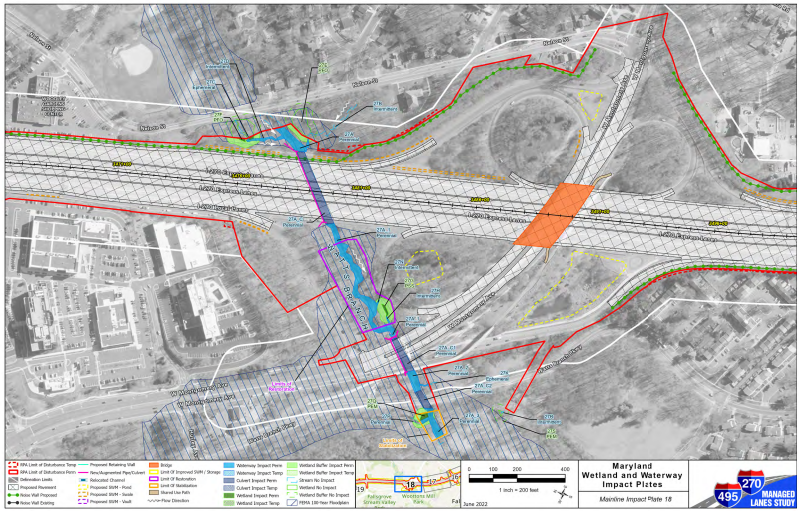Keep Fighting Highway Expansion – Submit Comments on the MD “Op Lanes” Wetlands & Waterways Permit – Due Thurs., Sep. 29
Update 9/29/22:
NOTE: The public comment period has been extended to October 28, 2022.
Along with many partners, ANS has continued to fight the wrong-headed decision to expand the Beltway and I-270 in Maryland. For years, Governor Hogan has pushed for a pre-determined solution to traffic: more pavement, built by a private operator to be funded with variable tolls. The entire process has barely considered transit alternatives or demand management strategies, and has pushed forward despite changes at the federal level requiring more consideration for climate change in planning highway projects. Now, the Federal Highways Administration and Maryland Department of Transportation have issued a Record of Decision choosing a final Phase I alternative – I-270 widening and replacement (and widening) of the American Legion Bridge. The next step is to acquire permits from the US Army Corps of Engineers and Maryland Department of the Environment for “unavoidable” impacts to wetlands and waterways.
TAKE ACTION by THURSDAY: Join us in saying NO to these permits!
Use the form below to send your letter to Mr. Steve Hurt at MDE and Mr. Nicholas Ozburn at the Army Corps of Engineers. In your own words, write a few sentences that address any of the following issues:
- The National Environmental Policy Act (NEPA) analysis and alternatives selection was flawed by relying too heavily on financial analysis, failing to consider a transit-focused, non-highway alternative, and insufficiently considering the cumulative and indirect impacts of highway widening including future planned phases of Beltway expansion and induced suburban sprawl.
- It is not in the public interest (one of the criteria the Corps must consider) to permit more polluting highway lanes designed to carry more cars in a time of crisis. We can’t wait – we need to change our transportation infrastructure NOW to reduce car use dramatically, not lock in more polluting pavement for another generation.
- IF the project moves forward, compensatory mitigation plans are inappropriate and insufficient. While Cabin John Creek will suffer the majority of the permanent impacts from Phase I widening, compensatory mitigation is all planned in other sub-watersheds – including in Frederick County! If you must hurt one creek, you should heal that creek, in accordance with Montgomery County’s watershed management plans. And most of the mitigation should consist of upland stormwater management, not only in-stream or wetland restoration, to heal some of the root causes of stream degradation and not risk future blowouts of any restorations that do get put in place.
Read: ANS and 26 other organizations recommend DENIAL of the JPA permit
Watch: Virtual Public Testimony on the JPA permit
At 2:44:33 and 2:58:08 in the recording below, you can hear the public testimony of Denisse Guitarra, ANS MD Conservation Advocate, and Eliza Cava, ANS Conservation Director.

